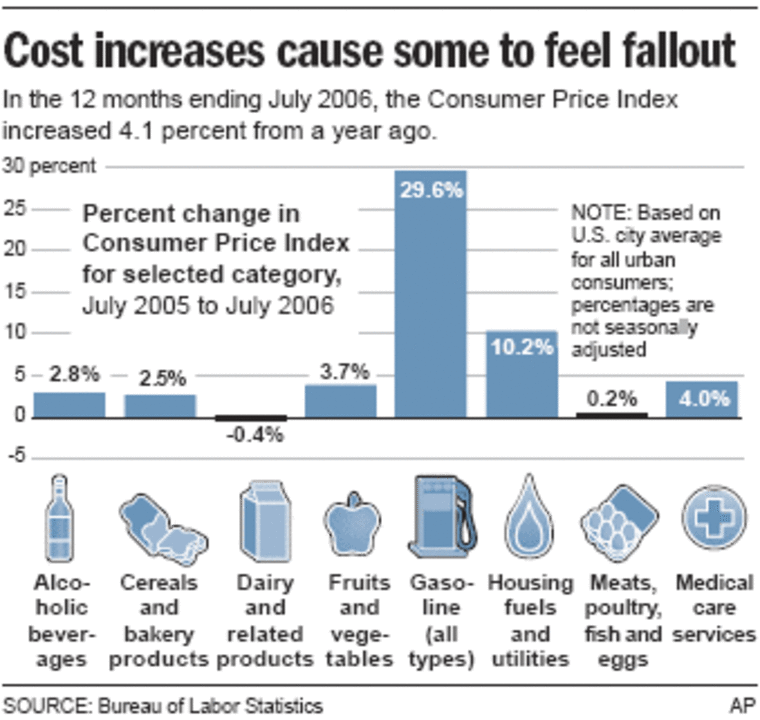While prices at the gas pumps get a lot of attention, other increases are pulling at Americans' pocketbooks from a variety of directions.
"We see it daily as far as everything we need for the kids; groceries, the little one still in diapers; anything that has to do with the house," said Mary Ann Ray, 32, a registered nurse and mother of two in suburban Union Township just east of Cincinnati.
Besides spending $10 to $15 more to fill up her minivan than she did a year or so ago, she ticks off a litany of other higher prices squeezing the once-comfortable household budget of her and her husband, the product development director for an educational software company. They include over-the-counter drugs, delivery pizzas, baby formula.
"It's all the little things," she said. "What I see is that you get your typical raises for work, but it seems like everything gets more expensive."
The ripple effect into the everyday economy as big companies try to offset increased costs for energy, transportation and raw materials is a creeping inflation that economists are watching, as the Federal Reserve balances inflation concerns against a slowing economy. While recent economic data indicated that inflation pressures are easing, consumer surveys show inflation worries are contributing to declining confidence about the economy.
And more price increases are coming.
In summer earnings reports, company after company has reported plans to pass along some of their higher costs in pricing of some or most of their products, from Energizer Holdings Inc.'s batteries to Eastman Kodak Co. film; Whirlpool Corp. appliances to Clorox Co. household cleaners; Anheuser-Busch Cos. Inc. beer to meals in some Buffalo Wild Wings Inc. restaurants.
Small businesses affected
Some small businesspeople are feeling the ripples, too.
"My costs have gone up. Shipping has definitely gone up," said Toni Sander, who sells gourmet foods and coffees, gift baskets and fine wines at her store, The Wine List, in the northern Cincinnati suburb of West Chester. "Shipping bills are half the cost of some of the food orders."
The federal Labor Department reported a July core consumer inflation increase of 0.2 percent, the lowest in five months. But core inflation, which excludes energy and food, has risen by 2.7 percent over the past 12 months.
"They don't have inflation under control. You go out to Adams County (a rural area east of Cincinnati) and ask anybody, 'Does it cost more to live every day?' They'll tell you 'yes,'" said Paul Hackett, a Cincinnati attorney who ran for Congress last year as a Democrat.
Jay McIntosh, Chicago-based Americas director for retail and consumer products for Ernst & Young, said while the costs of gasoline, health care costs, college tuition and other areas have been rising steadily for years, some everyday items are climbing now, too.
"I think consumers are feeling it a little more day to day," McIntosh said. He said that large companies that have kept prices down by cutting back internally or increasing productivity are facing increasing pressure because of spiraling energy and commodity prices fueled partly by growing consumption by China.
"It seems like right now, it's a little bit more difficult to keep from raising prices," McIntosh said.
James Brock, a Miami University economics professor, said "the $64,000 question" is how much longer companies can keep rising costs from spilling heavily into the consumer marketplace.
"This has been somewhat of a mystery so far, and something (policymakers) are struggling with," Brock said. "The question is when does that really start to show up at the retail level and the cash register. Big companies like Procter & Gamble can make modifications in the ways they do things to keep the lid on prices. Honestly, I've been surprised that it hasn't shown up more than it has."
Clayt Daley, chief financial officer of Procter & Gamble Co., said during an Aug. 2 conference call that the consumer products company has at times adjusted its spending in areas such as promotions while monitoring what the competition does with prices.
"Competitors have had the same issues on costs ... we have had, I think, pretty orderly price increases in most of our businesses around the world during this upswing in commodity and energy prices," Daley said.

P&G cited increased pulp and natural gas costs on Bounty paper towels and Charmin toilet paper and high zinc costs for Duracell batteries in raising prices around 6 percent on those products this year, for example.
Executives of Kellogg Co., maker of popular cereals such as Rice Krispies and frozen foods such as Eggo waffles, told analysts July 27 that the company is absorbing $180 million this year in additional costs, mainly for energy, sugar and wheat. While strong sales growth helped boost Kellogg's second-quarter profit by 3 percent, the company said it needed to boost some prices.
"Obviously, as we see the impact of this particular cycle of cost inflation, we believe in pricing and we are pricing against that to help sustain our business model," said Jim Jenness, Kellogg's chairman and chief executive.
While some price increases announced this summer, such as airline fares, took effect immediately, shoppers will see others, such as Kellogg's, going up on store price tags late this year or early next year.
"They (consumers) will have to cut back on something," said Brock, the economics professor. "Then you raise the bigger of question of OK, if that happens, will that create a slump in the economy?"
Sander is looking ahead, buying holiday items now to avoid price increases during the season and ordering bigger quantities to get shipping discounts.
The Rays have considered moving to reduce housing costs, including rising property taxes, and may cut down on dining out or carryout meals.
"Even things you think are cheap are going up," Mary Ann said.
